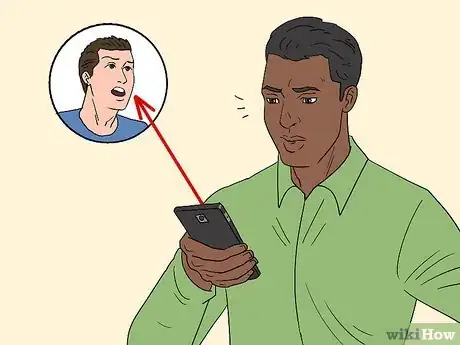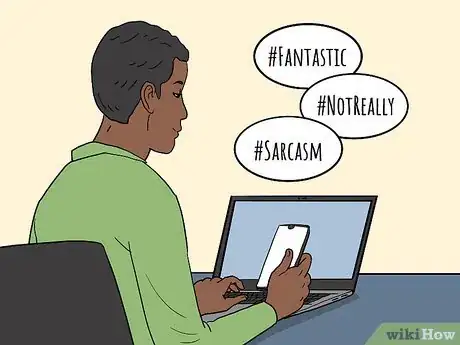This article was co-authored by Nicolette Tura, MA and by wikiHow staff writer, Jessica Gibson. Nicolette Tura is an Authentic Living Expert who operated her own wellness business for more than ten years in the San Francisco Bay Area. Nicolette is a 500-hour Registered Yoga Teacher with a Psychology & Mindfulness Major, a National Academy of Sports Medicine (NASM) certified Corrective Exercise Specialist, and is an expert in authentic living. She holds a BA in Sociology from the University of California, Berkeley and got her master's degree in Sociology from SJSU. She constantly draws from her own wounds and challenges; with her training in the healing arts and sociology, she offers potent content, powerful meditations, and game-changing seminars on inspiring elevation on a personal and corporate level.
There are 7 references cited in this article, which can be found at the bottom of the page.
This article has been viewed 251,510 times.
Does your classmate really love your new bag? Is the gas station attendant actually having the best day of their life? Thanks to sarcasm, it's not always easy to tell. Fortunately, even though sarcasm can be super subtle, there are still easy ways to detect it. Follow the tips below to find out whether someone really means what they're saying or if they're just trying to be ironic.
Steps
Noticing Vocal Cues
-
1Recognize that one word is usually emphasized. The person may pause slightly before saying it or drawing out the syllables. The stressed word usually exaggerates that you mean the opposite of what you're saying.[1]
- For example, they're probably being sarcastic if they say, "I got this gorgeous olive and orange sweater for my birthday."
Tip: If the speaker is drawing out a short word, they'll extend the vowels. "I reeeally like it," "You're soooo welcome," and "Greaaat," are all examples.
-
2Notice changes in pitch when the person is speaking. If the person has been animated, they might drop their pitch and deliver the sarcastic statement in a monotone voice. If the delivery is completely without expression, it's sometimes called "deadpan."
- For example, they might respond to someone else's excitement by stating, "yay," in a low, bland tone.
Advertisement -
3Listen for exaggerated enthusiasm. Although many people deliver sarcastic phrases in a monotone voice, others make their pitch higher and feign excitement when emphasizing a word. Remember to pay attention to context. They're probably being sarcastic if they're getting excited about something that's not interesting.
- For example, they might say, "I can't believe you're asking me out if your other date falls through! I'm so lucky!"
-
4Pay attention to sighing and muttering. Sarcasm can be delivered in a few different ways. The person might be sarcastic if they give a heavy sigh and then make their statement. They could also be sarcastic if they're quietly muttering, especially if they're difficult to hear.[2]
- If the person sighs heavily, they may want you to recognize that they're being sarcastic.
Watching Physical Cues
-
1See if the person rolls their eyes or looks away. Although someone may stare you directly in the eyes while they deliver a sarcastic comment, people usually roll their eyes. They may also look away or exaggerate their eyebrow movements.
- For example, they might raise their eyebrows or even open their eyes wider to exaggerate them.
-
2Look for exaggerated expressions that don't match what the person is saying. Pay attention to the person's face while they speak. Sometimes a facial expression that's at odds with what they're saying is the only way to detect sarcasm.
- For example, they might say, "Sure! I love giving up my free time to help you move." Although the words could be genuine, it's probably sarcasm if they look away and aren't smiling when they say them.
Tip: Other sarcastic expressions include tight or half-smiles and smirking.
-
3Pay attention to facial expressions of disgust or irritation. Again, watch the person's face as they deliver a phrase that could be earnest or sarcastic. Saying something like, "Oh, well done!" with a genuine smile probably means the person was being honest. If they were grimacing or scowling at you while they said it, they were most likely being sarcastic.[3]
- The person might also be sarcastic if they look disinterested or bored while saying something that should be exciting. "I can't wait to go to their wedding this week," for instance.
-
4Notice gestures that seem opposite of what's being said. Non-verbal cues can actually tell you a lot about what a person means when they're speaking. If someone dramatically throws themselves on a couch while saying, "I'm on it. I definitely won't waste any time in taking the trash out," they're probably being sarcastic.
- Other gestures include nodding the head vigorously and giving a thumbs-up sign when they're actually implying the opposite.
Did You Know? Cultures around the world have different ways of physically showing sarcasm. In Germany, for instance, a person will pull 1 of their lower eyelids down while saying something that's meant to be sarcastic.
Recognizing Sarcasm in Emails or Texts
-
1Expect sarcasm from people you know well. Since you won't be able to listen to the person's voice or watch their facial features, you don't have as much information to go off of. You'll need to think about how likely the person is to joke sarcastically with you. The less you know a person, the less likely they are to be sarcastic.
- Keep in mind that if you're exchanging professional emails with someone you don't know, they're probably not going to be sarcastic. However, if you're texting back and forth with an old friend, they may message something that could be sarcastic in tone.
-
2Check the email or text for emojis that show the opposite emotion of the message. These little images that are added to emails and text messages can be really helpful for deciding if someone is sarcastic. In some cases, the person will use face emojis that express the opposite of what they're writing. You can treat these face emojis like facial expressions. For example, a sarcastic text message to a friend might look like this:[4]
- "This date is going so well. We have so much in common," with an upside-down smiley face.
Tip: An upside-down smiley face is becoming a popular emoji to indicate sarcasm.
-
3Assume that bolded or italicized words are sarcastic. Instead of listening for someone to stress a certain word in a sarcastic way, check the email or text for bolded or italicized words. These are meant to stand out so they change the tone of the message.
- For example, some might respond to a text or email saying, "Of course I'd love to watch your favorite movie for the fifth time. I'm sure we'll get around to my choices sometime next year."
- The writer might also put exaggerated words in parenthesis after a sentence. For example, "I can't believe the kids don't want to go back to school (wow!)."
-
4Read emails, texts, and social media posts for the hashtag #sarcasm. Sarcasm can be difficult to detect on social media, but some hashtags take out the guesswork. #Sarcasm is an obvious indicator and you might also see #Not Really or #Fantastic.[5]
- "Let's make this week great!" seems sincere, but adding #sarcasm changes the meaning.
Evaluating the Situation
-
1Expect sarcasm from friends rather than strangers. If you don't know someone very well, it can be hard to determine if they're being sarcastic. However, this can also mean that they're less likely to joke or use sarcasm with you. People you're familiar with or joke with often are more likely to use sarcasm, so keep this in mind.[6]
- People tend to avoid sarcasm in professional situations.
-
2Pay attention to overly positive or negative language. Exaggerated remarks are often a sign of sarcasm, especially if the person is responding to an obvious question.
- For example, you might say, "You probably don't want to pull an extra shift, do you?" The person may sarcastically respond with, "Yes! There's nothing I'd love more than to pull a double on my day off."
-
3Listen for sarcasm in stressful or tense situations. People use sarcasm to deal with a variety of situations, but you'll probably notice more sarcasm after something bad happens or someone makes a mistake. Someone might make a sarcastic comment after another person points out the obvious.[7]
- If something annoying happens, they might say, "That's just what I need right now."
- If something expected happens, they may reply, "Who would have thought!"
- If a person makes a mistake, they might say, "Oh, really good job!"
- If someone points out something obvious, the person may say, "Wow. Did you figure that out for yourself?"
-
4Determine if the person is being critical. Most sarcastic comments are condescending, judgemental, or not meant to be taken literally. Think about how their comment made you feel. Sarcasm usually makes you look or feel foolish.
- For example, someone might tell their sloppy partner, "I just love getting to put your things back where they belong. How else would you be able to then toss them on the floor?"
Community Q&A
-
QuestionWhat if it's just someone passing by talking to their friends and I hear them say something about me?
 Community AnswerEither ignore it or calmly confront them about it. Just say something like, "Did you just say my name?" or, "Are you talking about me?" If they say no, just let it go. It's just gossip, and it's not worth getting upset over.
Community AnswerEither ignore it or calmly confront them about it. Just say something like, "Did you just say my name?" or, "Are you talking about me?" If they say no, just let it go. It's just gossip, and it's not worth getting upset over. -
QuestionIf some say there is enough room in the car, and I reply yes, how would you take it?
 Community AnswerIt depends entirely on your tone of voice and/or facial expression. If you just said "yes" neutrally, it would seem you're simply agreeing with them.
Community AnswerIt depends entirely on your tone of voice and/or facial expression. If you just said "yes" neutrally, it would seem you're simply agreeing with them. -
QuestionDoes this apply to both genders, and all ages?Yes, the tips that are given in this article apply to all genders and ages.
References
- ↑ http://socialcommunication.truman.edu/attitudes-emotions/sarcasm/
- ↑ http://socialcommunication.truman.edu/attitudes-emotions/sarcasm/
- ↑ https://kids.frontiersin.org/articles/10.3389/frym.2018.00056
- ↑ https://www.technologyreview.com/s/608387/an-algorithm-trained-on-emoji-knows-when-youre-being-sarcastic-on-twitter/
- ↑ https://pdfs.semanticscholar.org/9cad/478afb6856ee59e5d799109b16b1d331ba81.pdf
- ↑ https://www.smithsonianmag.com/science-nature/the-science-of-sarcasm-yeah-right-25038/
- ↑ https://tfcs.baruch.cuny.edu/sarcasm/
- ↑ https://archives.cjr.org/language_corner/language_corner_062314.php













































































